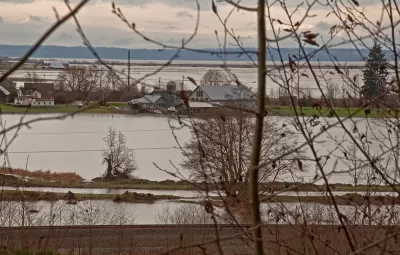Recent heavy rains and flooding have put the the U.S. Army Corps of Engineers on the defensive about its flood control policies and procedures.

Massive flooding this spring in the Midwest and beyond has put a renewed spotlight on the U.S. Army Corps of Engineers, report Manny Fernandez and John Schwartz:
Local and federal lawmakers in both parties, as well as flooded residents and their lawyers, say the Army Corps has mismanaged its waterways, allowed its infrastructure to age and crumble — the average age of the more than 700 dams it operates is 56 years — and has moved away from its flood-control mission in favor of protecting endangered wildlife as well as commercial and recreational interests.
Corps officials say they have had no choice in terms of releasing water from full reservoirs in a number of states. But homeowners and farmers dealing with the resulting flooding say that the agency should have released water earlier in the year before the rains came. Still, the Corps stands behind its flood management protocols, and officials say that some flooding needs to occur to prevent large-scale destruction.
The issue of how flooding is handled is not new, and last year the agency lost a federal lawsuit related to flood management along the Missouri River. "The judge found that a series of changes the Corps had made in the management of the Missouri River worsened flooding during more than 100 flood events from 2007 to 2014," note Fernandez and Schwartz.
FULL STORY: Army Corps Under Fire: In a Flood, It Released More Water

Montreal Mall to Become 6,000 Housing Units
Place Versailles will be transformed into a mixed-use complex over the next 25 years.

Planetizen Federal Action Tracker
A weekly monitor of how Trump’s orders and actions are impacting planners and planning in America.

DARTSpace Platform Streamlines Dallas TOD Application Process
The Dallas transit agency hopes a shorter permitting timeline will boost transit-oriented development around rail stations.

Interactive Map Reveals America's “Shade Deserts”
Launched by UCLA and American Forests to combat heat-related deaths, the tool maps the shade infrastructure for over 360 U.S. cities.

Bicycles and Books — In Sacramento, Libraries Now Offer Both
Adult library card holders can check out e-bikes and e-trikes for up to one week.

Colorado Landfills Emit as Much Pollution as 1M Cars
Landfills are the third-largest source of methane pollution in Colorado, after agriculture and fossil fuel extraction.
Urban Design for Planners 1: Software Tools
This six-course series explores essential urban design concepts using open source software and equips planners with the tools they need to participate fully in the urban design process.
Planning for Universal Design
Learn the tools for implementing Universal Design in planning regulations.
City of Mt Shasta
City of Camden Redevelopment Agency
City of Astoria
Transportation Research & Education Center (TREC) at Portland State University
City of Camden Redevelopment Agency
Municipality of Princeton (NJ)
Regional Transportation Commission of Southern Nevada





























